The Time Machine — EN
VI
The Sunset of Mankind
“A queer thing I soon discovered about my little hosts, and that was their lack of interest. They would come to me with eager cries of astonishment, like children, but like children they would soon stop examining me and wander away after some other toy. The dinner and my conversational beginnings ended, I noted for the first time that almost all those who had surrounded me at first were gone. It is odd, too, how speedily I came to disregard these little people. I went out through the portal into the sunlit world again as soon as my hunger was satisfied. I was continually meeting more of these men of the future, who would follow me a little distance, chatter and laugh about me, and, having smiled and gesticulated in a friendly way, leave me again to my own devices.
“The calm of evening was upon the world as I emerged from the great hall, and the scene was lit by the warm glow of the setting sun. At first things were very confusing. Everything was so entirely different from the world I had known – even the flowers. The big building I had left was situated on the slope of a broad river valley, but the Thames had shifted perhaps a mile from its present position. I resolved to mount to the summit of a crest perhaps a mile and a half away, from which I could get a wider view of this our planet in the year Eight Hundred and Two Thousand Seven Hundred and One A.D. For that, I should explain, was the date the little dials of my machine recorded.
“As I walked I was watching for every impression that could possibly help to explain the condition of ruinous splendour in which I found the world – for ruinous it was. A little way up the hill, for instance, was a great heap of granite, bound together by masses of aluminium, a vast labyrinth of precipitous walls and crumpled heaps, amidst which were thick heaps of very beautiful pagoda-like plants – nettles possibly – but wonderfully tinted with brown about the leaves, and incapable of stinging. It was evidently the derelict remains of some vast structure, to what end built I could not determine. It was here that I was destined, at a later date, to have a very strange experience – the first intimation of a still stranger discovery – but of that I will speak in its proper place.
“Looking round with a sudden thought, from a terrace on which I rested for a while, I realized that there were no small houses to be seen. Apparently the single house, and possibly even the household, had vanished. Here and there among the greenery were palace-like buildings, but the house and the cottage, which form such characteristic features of our own English landscape, had disappeared.
“”Communism,” said I to myself.
“And on the heels of that came another thought. I looked at the half-dozen little figures that were following me. Then, in a flash, I perceived that all had the same form of costume, the same soft hairless visage, and the same girlish rotundity of limb. It may seem strange, perhaps, that I had not noticed this before. But everything was so strange. Now, I saw the fact plainly enough. In costume, and in all the differences of texture and bearing that now mark off the sexes from each other, these people of the future were alike. And the children seemed to my eyes to be but the miniatures of their parents. I judged, then, that the children of that time were extremely precocious, physically at least, and I found afterwards abundant verification of my opinion.
“Seeing the ease and security in which these people were living, I felt that this close resemblance of the sexes was after all what one would expect; for the strength of a man and the softness of a woman, the institution of the family, and the differentiation of occupations are mere militant necessities of an age of physical force; where population is balanced and abundant, much childbearing becomes an evil rather than a blessing to the State; where violence comes but rarely and off-spring are secure, there is less necessity – indeed there is no necessity – for an efficient family, and the specialization of the sexes with reference to their children’s needs disappears. We see some beginnings of this even in our own time, and in this future age it was complete. This, I must remind you, was my speculation at the time. Later, I was to appreciate how far it fell short of the reality.
“While I was musing upon these things, my attention was attracted by a pretty little structure, like a well under a cupola. I thought in a transitory way of the oddness of wells still existing, and then resumed the thread of my speculations. There were no large buildings towards the top of the hill, and as my walking powers were evidently miraculous, I was presently left alone for the first time. With a strange sense of freedom and adventure I pushed on up to the crest.
“There I found a seat of some yellow metal that I did not recognize, corroded in places with a kind of pinkish rust and half smothered in soft moss, the arm-rests cast and filed into the resemblance of griffins’ heads. I sat down on it, and I surveyed the broad view of our old world under the sunset of that long day. It was as sweet and fair a view as I have ever seen. The sun had already gone below the horizon and the west was flaming gold, touched with some horizontal bars of purple and crimson. Below was the valley of the Thames, in which the river lay like a band of burnished steel. I have already spoken of the great palaces dotted about among the variegated greenery, some in ruins and some still occupied. Here and there rose a white or silvery figure in the waste garden of the earth, here and there came the sharp vertical line of some cupola or obelisk. There were no hedges, no signs of proprietary rights, no evidences of agriculture; the whole earth had become a garden.
“So watching, I began to put my interpretation upon the things I had seen, and as it shaped itself to me that evening, my interpretation was something in this way. (Afterwards I found I had got only a half-truth – or only a glimpse of one facet of the truth.)
“It seemed to me that I had happened upon humanity upon the wane. The ruddy sunset set me thinking of the sunset of mankind. For the first time I began to realize an odd consequence of the social effort in which we are at present engaged. And yet, come to think, it is a logical consequence enough. Strength is the outcome of need; security sets a premium on feebleness. The work of ameliorating the conditions of life – the true civilizing process that makes life more and more secure – had gone steadily on to a climax. One triumph of a united humanity over Nature had followed another. Things that are now mere dreams had become projects deliberately put in hand and carried forward. And the harvest was what I saw!
“After all, the sanitation and the agriculture of today are still in the rudimentary stage. The science of our time has attacked but a little department of the field of human disease, but even so, it spreads its operations very steadily and persistently. Our agriculture and horticulture destroy a weed just here and there and cultivate perhaps a score or so of wholesome plants, leaving the greater number to fight out a balance as they can. We improve our favourite plants and animals – and how few they are – gradually by selective breeding; now a new and better peach, now a seedless grape, now a sweeter and larger flower, now a more convenient breed of cattle. We improve them gradually, because our ideals are vague and tentative, and our knowledge is very limited; because Nature, too, is shy and slow in our clumsy hands. Some day all this will be better organized, and still better. That is the drift of the current in spite of the eddies. The whole world will be intelligent, educated, and co-operating; things will move faster and faster towards the subjugation of Nature. In the end, wisely and carefully we shall readjust the balance of animal and vegetable to suit our human needs.
“This adjustment, I say, must have been done, and done well; done indeed for all Time, in the space of Time across which my machine had leaped. The air was free from gnats, the earth from weeds or fungi; everywhere were fruits and sweet and delightful flowers; brilliant butterflies flew hither and thither. The ideal of preventive medicine was attained. Diseases had been stamped out. I saw no evidence of any contagious diseases during all my stay. And I shall have to tell you later that even the processes of putrefaction and decay had been profoundly affected by these changes.
“Social triumphs, too, had been effected. I saw mankind housed in splendid shelters, gloriously clothed, and as yet I had found them engaged in no toil. There were no signs of struggle, neither social nor economical struggle. The shop, the advertisement, traffic, all that commerce which constitutes the body of our world, was gone. It was natural on that golden evening that I should jump at the idea of a social paradise. The difficulty of increasing population had been met, I guessed, and population had ceased to increase.
“But with this change in condition comes inevitably adaptations to the change. What, unless biological science is a mass of errors, is the cause of human intelligence and vigour? Hardship and freedom: conditions under which the active, strong, and subtle survive and the weaker go to the wall; conditions that put a premium upon the loyal alliance of capable men, upon self-restraint, patience, and decision. And the institution of the family, and the emotions that arise therein, the fierce jealousy, the tenderness for offspring, parental self-devotion, all found their justification and support in the imminent dangers of the young. Now, where are these imminent dangers? There is a sentiment arising, and it will grow, against connubial jealousy, against fierce maternity, against passion of all sorts; unnecessary things now, and things that make us uncomfortable, savage survivals, discords in a refined and pleasant life.
“I thought of the physical slightness of the people, their lack of intelligence, and those big abundant ruins, and it strengthened my belief in a perfect conquest of Nature. For after the battle comes Quiet. Humanity had been strong, energetic, and intelligent, and had used all its abundant vitality to alter the conditions under which it lived. And now came the reaction of the altered conditions.
“Under the new conditions of perfect comfort and security, that restless energy, that with us is strength, would become weakness. Even in our own time certain tendencies and desires, once necessary to survival, are a constant source of failure. Physical courage and the love of battle, for instance, are no great help – may even be hindrances – to a civilized man. And in a state of physical balance and security, power, intellectual as well as physical, would be out of place. For countless years I judged there had been no danger of war or solitary violence, no danger from wild beasts, no wasting disease to require strength of constitution, no need of toil. For such a life, what we should call the weak are as well equipped as the strong, are indeed no longer weak. Better equipped indeed they are, for the strong would be fretted by an energy for which there was no outlet. No doubt the exquisite beauty of the buildings I saw was the outcome of the last surgings of the now purposeless energy of mankind before it settled down into perfect harmony with the conditions under which it lived – the flourish of that triumph which began the last great peace. This has ever been the fate of energy in security; it takes to art and to eroticism, and then come languor and decay.
“Even this artistic impetus would at last die away – had almost died in the Time I saw. To adorn themselves with flowers, to dance, to sing in the sunlight: so much was left of the artistic spirit, and no more. Even that would fade in the end into a contented inactivity. We are kept keen on the grindstone of pain and necessity, and, it seemed to me, that here was that hateful grindstone broken at last!
“As I stood there in the gathering dark I thought that in this simple explanation I had mastered the problem of the world – mastered the whole secret of these delicious people. Possibly the checks they had devised for the increase of population had succeeded too well, and their numbers had rather diminished than kept stationary. That would account for the abandoned ruins. Very simple was my explanation, and plausible enough – as most wrong theories are!
queer kwɪə adj Deviating from the customary: strange, curious, odd, peculiar, singular, quaint, weird
to come to ⇒ To begin to.
disregard ˌdɪsrɪˈgɑːd v To pay no attention to: ignore, snub, cut
chatter ˈʧætə v To talk continuously in a fast informal way, usually about unimportant subjects.
gesticulate ʤɛsˈtɪkjʊleɪt v To make gestures especially while speaking, as for emphasis.
to leave someone to his own devices ⇒ To let someone do whatever one can/wants.
summit ˈsʌmɪt n The highest point: peak, crown, climax, pinnacle, acme
 crest krɛst n The top, as of a hill or wave; the highest point.
crest krɛst n The top, as of a hill or wave; the highest point.
ruinous ˈrʊɪnəs adj Causing ruin or destruction: destructive, fatal, disastrous, catastrophic
splendour ˈsplɛndə n A refined quality of gracefulness and good taste: elegance, magnificence
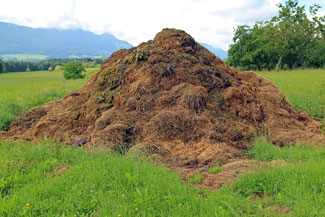 heap hiːp n A large, disordered pile of things: pile
heap hiːp n A large, disordered pile of things: pile
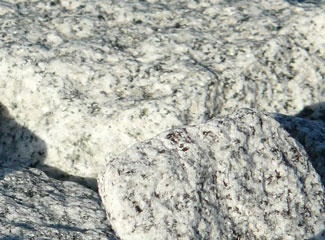 granite ˈgrænɪt n A usually light-colored, coarse-grained igneous rock composed mostly of quartz, feldspar, and mica, one of the most common rocks in the crust of continents.
granite ˈgrænɪt n A usually light-colored, coarse-grained igneous rock composed mostly of quartz, feldspar, and mica, one of the most common rocks in the crust of continents.
 labyrinth ˈlæbərɪnθ n Something that is intricately and often bewilderingly complex: knot, maze, web, snarl
labyrinth ˈlæbərɪnθ n Something that is intricately and often bewilderingly complex: knot, maze, web, snarl
precipitous prɪˈsɪpɪtəs adj Very sharply inclined: bold, abrupt, sheer, steep, arduous, precipitate
crumpled ˈkrʌmpld adj Pressed or squeezed so that it is no longer flat or smooth: crushed, wrinkled, creased, ruffled
pagoda-like ⇒ Looking like a religious building of the Far East erected as a memorial or shrine.
 nettle ˈnɛtl n A tall plant with pointed leaves and small hairs that sting if you touch them.
nettle ˈnɛtl n A tall plant with pointed leaves and small hairs that sting if you touch them.
tint tɪnt v Colour lightly.
sting stɪŋ v To pierce or wound painfully with a sharp-pointed structure or organ, as that of certain insects or plants.
derelict ˈdɛrɪlɪkt adj Having been given up and left alone: abandoned, deserted, run-down
to what end ⇒ with what purpose.
destined ˈdɛstɪnd adj Seeming certain to happen at some time in the future.
intimation ˌɪntɪˈmeɪʃən n An indirect suggestion or sign that something is likely to happen or be true.
on the heels of ⇒ Following close behind or soon after someone or something.
visage ˈvɪzɪʤ n A person’s face, with reference to the form or proportions of the features.
girlish ˈgɜːlɪʃ adj Characteristic of or befitting a girl.
rotundity rəʊˈtʌndɪti n Roundness, plumpness.
to be alike ⇒ To be like one another.
but ⇒ (archaic) only.
precocious prɪˈkəʊʃəs adj Developing before the expected time: early, premature, untimely
after all ⇒ in spite of all.
differentiation ˌdɪfərɛnʃɪˈeɪʃən n Discrimination between things as different and distinct.
militant ˈmɪlɪtənt adj Inclined to act in a hostile way: aggressive, belligerent, combative
childbearing ˈʧaɪldˌbeərɪŋ n The process of giving birth to babies.
offspring ˈɒfsprɪŋ n Group consisting of those descended directly from the same parents or ancestors: issue, posterity, descendants
at the time ⇒ At a particular moment in the past; then.
to fall short of something ⇒ To go far from; fail to reach or obtain.
to muse on/upon/over ⇒ To think/pore over, to ponder.
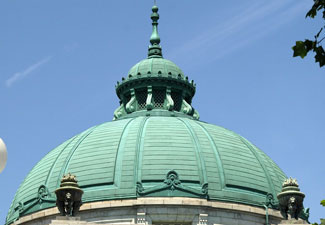 cupola ˈkjuːpələ n Domed roof or ceiling.
cupola ˈkjuːpələ n Domed roof or ceiling.
transitory ˈtrænsɪtəri adj Lasting only for a short time: temporary, momentary, ephemeral, short-lived, fleeting
to push on ⇒ To go forward in a determined way.
corrode kəˈrəʊd v To consume gradually, as by chemical reaction, friction, etc: wear, wear away, gnaw, erode, fret
 rust rʌst n Powdery reddish-brown coating formed on iron in the presence of water.
rust rʌst n Powdery reddish-brown coating formed on iron in the presence of water.
smother ˈsmʌðə v To stifle or kill by depriving of air: suffocate
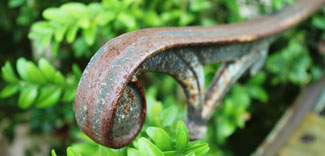 arm-rests ⇒ Objects for support of the arms (on chairs etc.).
arm-rests ⇒ Objects for support of the arms (on chairs etc.).
 griffin ˈgrɪfɪn n Fabulous beast with the head and wings of an eagle and the body of a lion.
griffin ˈgrɪfɪn n Fabulous beast with the head and wings of an eagle and the body of a lion.
to be touched with some colour ⇒ To have some colour tint.
 crimson ˈkrɪmzn n Deep to vivid purplish red to vivid red colour.
crimson ˈkrɪmzn n Deep to vivid purplish red to vivid red colour.
burnish ˈbɜːnɪʃ v To make smooth or glossy by rubbing: polish
variegated ˈveərɪgeɪtɪd n Varied in appearance, as by having different colors, forms, shapes, etc.
 greenery ˈgriːnəri n Green foliage; verdure.
greenery ˈgriːnəri n Green foliage; verdure.
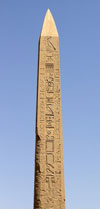 obelisk ˈɒbɪlɪsk n Tall, four-sided shaft of stone that rises to a point.
obelisk ˈɒbɪlɪsk n Tall, four-sided shaft of stone that rises to a point.
 hedge hɛʤ n A row of shrubs or small trees that are planted close to each other in order to form a boundary.
hedge hɛʤ n A row of shrubs or small trees that are planted close to each other in order to form a boundary.
proprietary prəˈpraɪətəri n Something owned, especially real estate.
facet ˈfæsɪt n The particular angle from which something is considered: side, aspect
to happen on ⇒ To come upon.
on/upon the wane ⇒ becoming less.
ruddy ˈrʌdi adj Of a reddish colour: rosy, florid, blooming, glowing
to set someone thinking ⇒ To provoke someone to start thinking about.
feebleness ˈfiːblnəs The state of being weak in health or body, especially from old age: infirmity, frailty, debility
ameliorate əˈmiːliəreɪt v To advance to a more desirable state: improve, amend, better, upgrade
to go to a climax ⇒ To move towards the highest point of.
harvest ˈhɑːvɪst n Something brought about by a cause: result, effect, consequence, outcome, aftermath
sanitation ˌsænɪˈteɪʃən n Application of measures designed to protect public health.
rudimentary ˌruːdɪˈmɛntəri adj Being in the earliest stages of development: elementary
horticulture ˈhɔːtɪkʌlʧə n Growing flowers, fruit and vegetables.
here and there ⇒ in various places.
score skɔː n A group of 20 things.
or so ⇒ (of quantities) Imprecise but fairly close to.
 peach piːʧ n A soft, juicy, edible fruit that has downy yellow or reddish skin and a single large rough stone.
peach piːʧ n A soft, juicy, edible fruit that has downy yellow or reddish skin and a single large rough stone.
vague veɪg adj Not clearly perceptible: faint, dim, obscure, hazy, misty, bleary, cloudy, unclear
tentative ˈtɛntətɪv adj Hesitant or unsure.
clumsy ˈklʌmzi adj Lacking physical coordination, skill, or grace: awkward
the drift of the current ⇒ The slow part of the otherwise fast-moving water.
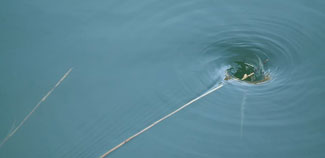 eddy ˈɛdi n Circular or spiral movement: whirl
eddy ˈɛdi n Circular or spiral movement: whirl
subjugation ˌsʌbʤʊˈgeɪʃən n Subjection, enslavement.
in the end ⇒ finally.
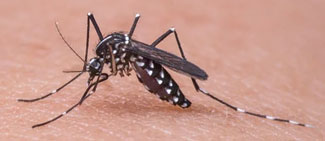 gnat næt n Mall, biting, two-winged fly.
gnat næt n Mall, biting, two-winged fly.
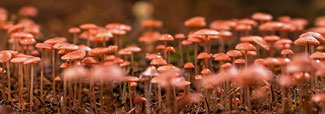 fungus ˈfʌŋgəs pl fungi ˈfʌŋgaɪ n Flower without leaves etc. growing on other plants or decaying matter.
fungus ˈfʌŋgəs pl fungi ˈfʌŋgaɪ n Flower without leaves etc. growing on other plants or decaying matter.
hither and thither ⇒ To many places; here and there.
preventive prɪˈvɛntɪv adj Used to stop something bad from happening.
attain əˈteɪn v To gain as an objective: achieve
to stamp out ⇒ To destroy or end something.
contagious kənˈteɪʤəs adv Carrying or capable of spreading a disease.
putrefaction ˌpjuːtrɪˈfækʃən n The condition of being decayed: decomposition, decay, spoilage, rot
decay dɪˈkeɪ n Gradual deterioration to an inferior state; a falling into ruin.
splendid ˈsplɛndɪd adj Brilliant or fine, esp in appearance: excellent, wonderful, marvellous
toil tɔɪl v Work that is difficult and unpleasant and that lasts for a long time: hard work, labor
vigour ˈvɪgə n The quality of being physically strong: power, strength, might, potency
to go to the wall ⇒ To be defeated.
to put a premium on ⇒ To encourage, to foster.
restraint rɪsˈtreɪnt n A condition of being confined or deprived of liberty.
therein ðeərˈɪn adv In that place; in that circumstance.
jealousy ˈʤɛləsi n A feeling of iritation and upset because you think someone who you love is in love to someone else.
offspring ˈɒfsprɪŋ n Someone’s child or children.
devotion dɪˈvəʊʃən n Great love, interest, care and support for somebody or something
justification ˌʤʌstɪfɪˈkeɪʃən n A reason for something.
imminent ˈɪmɪnənt adj Something that is likely to happen very soon.
connubial kəˈnjuːbiəl adj Relating to marriage or the married state: conjugal
discord ˈdɪskɔːd v Lack of concord or harmony between persons or things:: difficulty, conflict, friction, clash, strife
slightness ˈslaɪtnəs n Instance of treating someone as unimportant: smallness
conquest ˈkɒŋkwɛst v The act or process of gaining control of or subdue by military force: win, subjugation, victory, success, defeat
vitality vaɪˈtælɪti n The ability to survive and grow.
under the new conditions ⇒ in the new state or situation of.
hindrance ˈhɪndrəns n Anything that impedes: barrier, obstacle, impediment, obstruction
out of place ⇒ unsuitable.
solitary ˈsɒlɪtəri adj Being the only one; single and isolated from others: lone, lonesome, only, sole
fret frɛt v To be anxious or worried: fuss, niggle
outlet ˈaʊtlɛt n Means of release for energies, drives, or desires.
exquisite ˈɛkskwɪzɪt adj Of special beauty or charm.
surge sɜːʤ v To emit in abundance: pour, rush, flow, well, gush
to settle down ⇒ To become calm.
flourish ˈflʌrɪʃ v To grow or develop well.
it takes to ⇒ it leads to.
eroticism ɪˈrɒtɪsɪzm n An erotic theme; sexual excitement.
languor ˈlæŋgə n Deficiency in mental and physical activity: lethargy, stupor, torpor, languidness
impetus ˈɪmpɪtəs A force that sets a body in motion: incentive, push, spur, motivation
at last ⇒ After a long wait; finally.
adorn əˈdɔːn v To lend beauty to; to furnish with decorations: decorate, grace, dress, ornament, deck, embellish
we are kept keen on the grindstone of pain and necessity ⇒ we are forced to live in pain and necessity; grindstone ˈgraɪndstəʊn n Revolving stone disk used for grinding, polishing, or sharpening tools; a millstone.
grindstone ˈgraɪndstəʊn n Revolving stone disk used for grinding, polishing, or sharpening tools; a millstone.
stationary ˈsteɪʃnəri adj Firmly in position: fixed, immobile, steadfast, unmoving
to account for ⇒ To give an explanation of.
plausible ˈplɔːzəbl n Apparently reasonable and credible, and therefore convincing: believable.